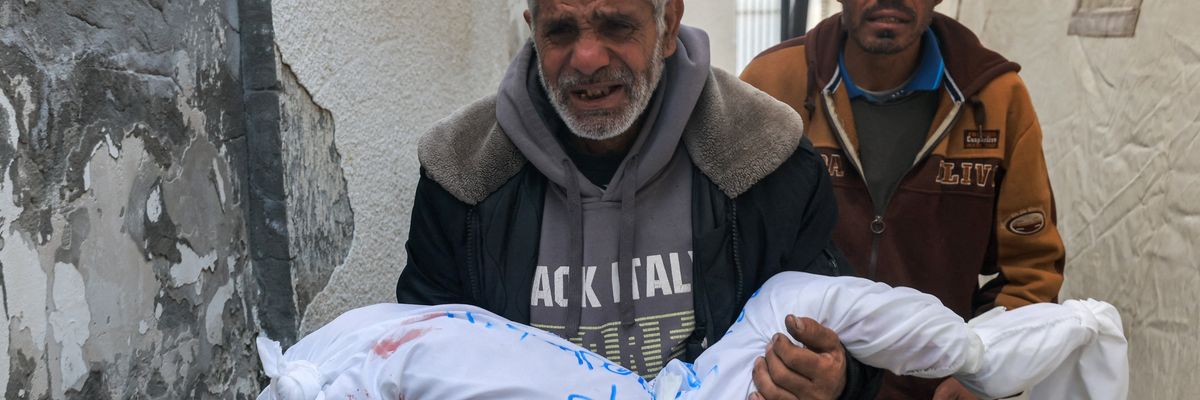The United Nations General Assembly on Tuesday passed a
resolution demanding "an immediate humanitarian cease-fire" in Israel's two-month war on Gaza after the U.S. last week used its permanent member status to veto a similar Security Council measure.
The resolution also demands "that all parties comply with their obligations under international law, including international humanitarian law, notably with regard to the protection of civilians," as well as "the immediate and unconditional release of all hostages, as well as ensuring humanitarian access."
The final vote during the General Assembly's emergency special session in New York was
153-10 with 23 abstentions.
"Humanity has prevailed," declared Egyptian Ambassador to the U.N. Osama Abdel Khalek after the vote. "This resolution must be implemented immediately. The Israeli aggression on Gaza must end. This bloodshed must stop."
Tuesday's meeting came after Egypt and Mauritania
invoked
Resolution 377A (V), which
states that "if the Security Council, because of lack of unanimity of the permanent members, fails to exercise its primary responsibility for the maintenance of international peace and security in any case where there appears to be a threat to the peace, breach of the peace, or act of aggression, the General Assembly shall consider the matter immediately."
Last week's U.S. veto came after United Nations Secretary-General António Guterres invoked Article 99, a rarely used section of the U.N. Charter empowering him to bring to the attention of the Security Council "any matter which in his opinion may threaten the maintenance of international peace and security," for the first time in his tenure.
Noting Guterres' message to the council as well as a recent letter from the commissioner-general of the United Nations Relief and Works Agency for Palestine Refugees in the Near East, the General Assembly resolution expresses "grave concern over the catastrophic humanitarian situation in the Gaza Strip and the suffering of the Palestinian civilian population," and emphasizes that "the Palestinian and Israeli civilian populations must be protected in accordance with international humanitarian law."
Israeli Ambassador Gilad Erdan on Tuesday had urged member states to oppose the resolution, arguing that it would amount to "voting in favor of a genocidal jihadist organization" and hamper Israel's ongoing operation to destroy Hamas.
"A cease-fire is a death sentence," claimed Erdan, who said the effort to pass the resolution made the United Nations "a moral stain on humanity."
Israel's assault on Gaza has killed at least 18,412 Palestinians and injured over 50,100 more, according to local health officials. The war has also devastated civilian infrastructure and displaced 85% of the besieged enclave's 2.3 million residents.
Urging the assembly to support the resolution, Francesca Albanese, the United Nations special rapporteur for the occupied Palestinian territories, said Tuesday that "the Israeli army is fighting everyone and everything in Gaza—including the U.N."
U.S. Ambassador Linda Thomas-Greenfield told the General Assembly that the United States agrees with some "aspects" of the resolution, including that conditions in Gaza are dire, people in the Palestinian territory need more aid, and hostages must be released. However, she also claimed that "any cease-fire right now would be temporary at the best and dangerous at worst."
The United States—which voted against the resolution on Tuesday— gives Israel $3.8 billion in annual military aid and Congress is now considering a new $14.3 billion package.
"Today the majority of the world stood together to demand an end to this bloodshed and suffering in Gaza. The United States has once again voted to allow the carnage against civilians in Gaza to continue," said Avril Benoît, executive director of Doctors Without Borders/Médecins Sans Frontières USA, after the vote.
"Today the U.S. failed to show compassion or leadership in the face of continued bombardment of human beings who are trapped in Gaza without food, water, shelter, or access to proper medical care," Benoît continued. "The U.S. is increasingly isolated in its steadfast support of a war that seems to have no rules and no limits, a war that Israel claims is focused on rooting out Hamas but that continues to kill large numbers of Palestinian civilians, mostly women, and children."
"The U.S. is increasingly isolated in its steadfast support of a war that seems to have no rules and no limits."
"Israel has continued to indiscriminately attack civilians and civilian structures, impose a siege that amounts to collective punishment for the entire population of Gaza, force mass displacement, and deny access to vital medical care and humanitarian assistance. The U.S. continues to provide political and financial support to Israel as it prosecutes its military operations regardless of the terrible toll on civilians. It is impossible to deliver humanitarian aid at scale in Gaza under current circumstances," she stressed. "For humanitarians to be able to respond to the overwhelming needs, we need a cease-fire now."
In addition to the resolution, the General Assembly on Tuesday considered two amendments—one from the
United States condemning "the heinous terrorist attacks by Hamas" on October 7 and the taking of hostages, and another from Austria to add language about Hamas to the line calling for the release of hostages.
Neither amendment got the two-thirds majority support needed to pass. The Austrian amendment vote was 89 in favor and 61 opposed with 20 abstentions while the U.S. amendment vote was 84-62 with 25 abstentions.
The General Assembly's previously approved resolution on Gaza, passed in late October, called for "an immediate, durable, and sustained humanitarian truce leading to a cessation of hostilities."
This post has been updated with comment from Doctors Without Borders.

